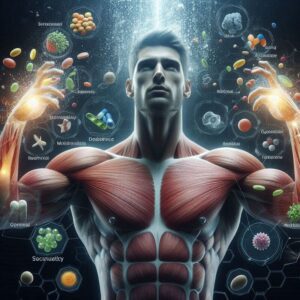Maximize Muscle Recovery: Essential Nutritional Strategies for Optimal Performance
To attain peak muscle recovery, it’s imperative to concentrate on the ideal macronutrient ratios within your diet. The three principal macronutrients—protein, carbohydrates, and fats—serve not just as energy sources, but also as the fundamental building blocks for your body's structural integrity and various physiological functions. Each macronutrient has a distinctive role in the repair and regeneration of muscle tissue. Therefore, athletes striving for enhanced athletic performance must grasp the interplay between these nutrients and how they collectively support recovery processes, ensuring that they are adequately fueled for future workouts and competitions.
Among these macronutrients, protein is particularly crucial for muscle recovery due to its composition of vital amino acids necessary for effective muscle repair and growth. By consuming an adequate amount of protein post-workout, you can significantly enhance muscle protein synthesis, which is the process where new muscle proteins are formed while simultaneously reducing the breakdown of existing proteins. This delicate balance is essential for optimal muscle recovery, allowing for quicker recuperation and adaptation to training stresses. Additionally, carbohydrates are vital in replenishing glycogen stores depleted during vigorous training, thus providing the necessary energy for subsequent workouts. Lastly, fats support energy production and hormone regulation, both of which are essential for effective muscle recovery.
To ascertain the most effective macronutrient ratio for your muscle recovery, a personalized approach is essential, factoring in individual elements such as body composition, workout intensity, and unique fitness goals. A common recommendation is to consume a blend of protein and carbohydrates within 30 minutes to 2 hours post-exercise to maximize recovery. This timing is critical because your body enters a heightened state of nutrient absorption, making it the perfect opportunity to nourish your muscles and facilitate recovery.

Explore Top Protein Sources for Accelerated Muscle Recovery
Recognizing that protein is not merely another dietary element, but a critical factor in muscle recovery, is vital for anyone engaged in physical training. This essential macronutrient supplies the amino acids necessary for muscle repair and growth, making it imperative to incorporate protein-rich foods into your diet to effectively bolster muscle restoration. High-quality sources of animal protein, including eggs, dairy products, lean meats, fish, and poultry, provide complete amino acid profiles that are especially beneficial for muscle regeneration and recovery.
For those who prefer plant-based options or wish to diversify their protein sources, there exists a broad spectrum of excellent alternatives. Foods such as lentils, chickpeas, and black beans are not only rich in nutrients but also loaded with protein, positively contributing to muscle recovery. Additionally, versatile options like tofu, tempeh, edamame, and other soy-based products offer fantastic complete protein sources that can be easily integrated into a balanced diet to support muscle healing.
Furthermore, protein supplements such as whey, casein, or plant-based powders can be particularly effective in boosting your protein intake specifically for muscle recovery. These supplements provide a convenient means to ensure you meet your post-workout protein needs, allowing for easy incorporation into your favorite smoothies, shakes, or meals, thus maximizing your recovery potential and reinforcing your fitness journey.
Replenish Vital Glycogen Stores with Carbohydrates for Enhanced Muscle Recovery
Carbohydrates are integral to muscle recovery as they replenish glycogen stores that become depleted during rigorous physical activity. Consuming carbohydrates within the initial 30 to 60 minutes after exercise can significantly aid in restoring energy levels and accelerating muscle recovery. During intense workouts, muscles primarily rely on glycogen as their main energy source, with the body being most efficient at storing glucose immediately post-exercise. Thus, the timing of carbohydrate intake is crucial and can profoundly impact muscle glycogen synthesis and overall recovery outcomes.
Incorporating a variety of nutrient-dense foods, including legumes, fruits, and vegetables that are rich in natural sugars and starches, can greatly enhance your muscle recovery while providing numerous health benefits. These food sources are generally high in fiber and packed with essential nutrients, delivering a steady release of energy alongside the vitamins and minerals necessary for overall well-being and effective recovery. By prioritizing these complex carbohydrates in your meals, you can make informed dietary decisions that significantly contribute to your body’s nutritional needs and recovery mechanisms.
Effective post-exercise nutrition is a crucial aspect of muscle recovery. Combining carbohydrates with protein can dramatically enhance muscle glycogen resynthesis and support effective muscular repair. This powerful nutrient combination also stimulates insulin release, facilitating the transport of glucose and amino acids into muscle cells, further enhancing recovery and repair processes.

Enhance Muscle Recovery with Healthy Fats: A Comprehensive Approach
While discussions surrounding muscle repair often emphasize protein and carbohydrates, dietary fats are equally crucial for a holistic approach to recovery and overall health. Healthy fats are vital for hormone production, particularly testosterone, which significantly impacts muscle growth and the repair processes occurring post-exercise. Foods rich in omega-3 fatty acids, such as walnuts, flaxseeds, and fatty fish, provide anti-inflammatory benefits that can help alleviate exercise-induced inflammation and expedite muscle recovery. Moreover, these fatty acids are essential for constructing cell membranes necessary for muscle repair.
Integrating a variety of healthy fat sources, including nuts, seeds, avocados, olive oil, and fatty fish, can offer substantial advantages for your overall health and muscle regeneration. These fats not only enhance the flavor of your post-exercise meals or snacks but also supply essential energy while supporting various physiological processes linked to recovery. Explore diverse healthy fat options and consciously incorporate them into your diet; your muscles will certainly respond positively to this focus!
While fats are an integral part of a balanced diet, moderation is key. Avoiding excessive consumption of unhealthy fats, such as trans and saturated fats, is crucial, as these can elevate inflammation and hinder healing and performance. Thus, achieving the right balance of fats in your diet is essential for attaining optimal muscle recovery and maintaining overall health.
Hydration: The Unsung Hero of Muscle Recovery
One of the most frequently overlooked aspects of muscle recovery is the vital role of hydration. During physical activity, our bodies lose fluids through sweating, and failing to replenish these lost fluids can lead to dehydration. This condition can severely hinder athletic performance and prolong muscle recovery time. Dehydration negatively impacts nutrient transport to muscles, increases the risk of cramping, and may even result in muscle damage, underscoring the importance of prioritizing hydration.
Maintaining appropriate hydration levels not only aids in muscle recovery but also contributes to overall health and well-being. Proper fluid intake supports nutrient transport, regulates body temperature, and helps eliminate waste products. Ensuring that you remain well-hydrated before, during, and after exercise is crucial for optimizing muscle recovery. While water is the most effective hydration solution, consider incorporating electrolyte-rich beverages such as sports drinks or coconut water to replenish lost electrolytes during intense workouts.
Being attuned to your body's hydration signals is vital for maximizing recovery. Monitoring indicators such as urine color, fluctuations in body weight, and feelings of thirst can provide valuable insights into your hydration status. This self-awareness can assist you in maintaining optimal fluid intake, consequently promoting maximum muscle repair. Additionally, incorporating more water-rich foods, such as fruits and vegetables, can further bolster your hydration and recovery efforts.

Essential Micronutrients for Accelerated Muscle Recovery
Comprehending the significance of micronutrients, which include vital vitamins and minerals, is essential for effective muscle recovery and overall health. These micronutrients should not be viewed as optional; they are fundamental components that influence numerous physiological processes, including exercise performance and recovery. For instance, the antioxidant properties of vitamin C can help alleviate the inflammatory and oxidative stress that arises during exercise, while vitamin D is critical in maintaining bone health and supporting muscle function, both of which are integral for recovery.
Critical minerals such as iron, magnesium, and zinc play significant roles in energy production, oxygen transport, and muscle functionality during physical activity. To foster optimal muscle repair, it is vital to consume a well-balanced diet rich in fruits, vegetables, whole grains, lean meats, and healthy fats, ensuring you receive these essential micronutrients.
Although athletes might consider supplementing with specific micronutrients to address deficiencies or meet the increased demands of rigorous training, it is crucial to seek professional guidance. Consulting with a healthcare professional or a certified dietitian before initiating any supplementation regimen can guarantee both safety and effectiveness, allowing you to feel more informed and confident in your dietary choices.
Ultimately, food plays a pivotal role in muscle recovery following intense physical activity. Striking the right balance among macronutrients—including protein, carbohydrates, and fats—combined with proper hydration and micronutrient intake, is vital for effective muscle regeneration and enhancing athletic performance. By being mindful of your dietary selections and providing your body with the necessary nutrients, you can promote quicker healing, reduce the risk of injury, and elevate your overall fitness level.
Answers to Common Questions: Muscle Recovery and Nutritional Guidance
What are the key processes involved in muscle recovery?
Muscle recovery encompasses a complex array of processes through which muscles repair and rebuild after experiencing physical stress, such as exercise or resistance training. This essential process is crucial for promoting muscle growth and enhancing overall physical performance, enabling your body to adapt to the demands of training effectively.
How does diet influence muscle recovery outcomes?
Your diet serves as a pivotal factor influencing muscle recovery, as it provides the essential nutrients that facilitate muscle repair and growth. Achieving the right balance among macronutrients (protein, carbohydrates, and fats) and micronutrients (vitamins and minerals) is vital for optimizing muscle recovery and enhancing overall athletic performance.
What dietary approach is most effective for muscle recovery?
The most effective diet for muscle recovery typically encompasses a balanced combination of high-quality protein, carbohydrates, and healthy fats. Foods rich in protein, such as lean meats, fish, eggs, and dairy products, are particularly advantageous for supporting muscle repair and growth. Carbohydrates are essential for providing energy for workouts and replenishing depleted glycogen stores, while healthy fats contribute to overall health and hormone production.
How much protein should I consume to support muscle recovery?
The general recommendation for protein intake aimed at muscle recovery ranges from 1.2 to 2.2 grams of protein per kilogram of body weight per day. This range may fluctuate based on individual factors, including activity level, muscle mass, and specific training objectives.
Are there specific foods that can effectively enhance muscle recovery?
Foods that are rich in protein, such as chicken, turkey, salmon, eggs, Greek yogurt, and tofu, are particularly effective in supporting muscle recovery. Moreover, incorporating complex carbohydrates from sources like whole grains, fruits, and vegetables, alongside healthy fats from avocados, nuts, and olive oil, can further facilitate muscle recovery and improve overall athletic performance.
Should I consider using supplements to aid my muscle recovery?
While a nutritious, well-rounded diet can generally provide the essential nutrients necessary for muscle recovery, some individuals may find it beneficial to supplement with protein powders, branched-chain amino acids (BCAAs), or creatine to support their recovery and performance goals. It is crucial to consult with a healthcare professional before introducing any supplements into your diet to ensure safety and effectiveness.
This valuable information is brought to you by:
Reliable Sources for Muscle Recovery and Nutritional Information
Nourish Your Hair: Protein Intake and Hair Health. https://www.theproteinfactory.pk/blog/protein-and-hair-health/
The Maximum Calorie Intake to Lose Weight | Woman – The Nest. https://woman.thenest.com/maximum-calorie-intake-lose-weight-17436.html
The Article: Optimal Diet for Muscle Recovery appeared first on Acupuncture Cottam.
The Article Muscle Recovery: The Optimal Diet You Need appeared first on https://mcrtherapies.com
The Article Optimal Diet for Muscle Recovery You Need Was Found On https://limitsofstrategy.com
The Article Muscle Recovery: The Optimal Diet You Need First Appeared ON
: https://ad4sc.com





Comments are closed